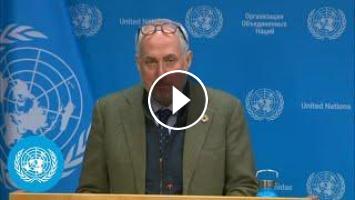Noon Briefing by Stéphane Dujarric, Spokesperson for the Secretary-General.
Highlights:
-Haiti
-Occupied Palestinian territory
-Prevention of genocide
-Lebanon
-Ukraine
-Malawi
-South Sudan
-Resident coordinator – Belarus
HAITI
The Office for the Coordination of Humanitarian Affairs says that our response continues even as the situation on the ground remains tense and volatile.
Schools and students in Port-au-Prince are paying a heavy price because of the ongoing violence. UNICEF condemned an arson attack on a school that took place on 25 March, depriving over 1,000 children of their right to education.
Across the country, UNICEF estimates that more than 1,000 schools have closed or suspended classes due to recent violence and insecurity.
As we’ve mentioned before, the health sector has also been severely impacted, with at least half of all health facilities in the Port-au-Prince metropolitan area either closed or having their operations severely disrupted.
The World Food Programme continues its daily hot meal programme for displaced people in Port-au-Prince.
Yesterday, our colleagues at WFP reached the largest number of people in a single day this month. They distributed 22,000 meals. Thanks to our local partners, the World Food Programme was also able to access 10 new sites for displaced people. Since early March, WFP and its partners have reached more than 54,000 displaced people with more than 263,000 hot meals in 38 different sites.
Also, since early March, more than two million liters of drinking water have been distributed by our partners, reaching some 60,000 displaced people in some 29 sites.
For its part, UNICEF and its partners have conducted more than 700 medical consultations in displacement sites over the last two weeks. Between 18-25 March, UNICEF provided psychosocial support to more than 600 children at displacement sites.
Recent events are curtailing people’s access to basic social services. The violence is also hampering aid operations, including access to the port where there are humanitarian supplies which remain at risk of being looted.
As we have said many times, we need safe and unhindered access to those in need, as well as urgent and flexible funding. The Humanitarian Response Plan for Haiti, which calls for $674 million, is currently only 6.6 per cent funded, which means that we have only $45 million in the till.
And also I think Maggie asked a question yesterday about funding.
WFP has been able to leverage the support of donors to continue hot-meals distributions in the short term. However, without ongoing support, WFP’s emergency assistance is under threat for the next few months.
For its emergency activities, including hot-meals distributions, WFP requires $61 million over the next six months. The overall funding gap is about $103 million – for the next six months.
OCCUPIED PALESTINIAN TERRITORY
Turning to the situation in the Occupied Palestinian Territory and in Gaza, the Office for the Coordination for Humanitarian Affairs stresses that, as more than 1.1 million people in Gaza face extreme levels of food insecurity, there is no alternative to the large-scale delivery of aid by land. But despite these urgent and overwhelming needs, hostilities and access impediments continue to hamper our efforts to get life-saving assistance to civilians in Gaza at the scale that we need to save lives.
Time and again, we have said that aid organizations need additional entry points and supply routes into Gaza – and safe and sustained access throughout the Gaza strip– to reach everyone who need to be reached. This includes access to the north.
Our humanitarian colleagues on the ground tell us that between 16 and 22 March, nine humanitarian aid missions to northern Gaza were facilitated by the Israeli authorities, but five were denied.
OCHA reports that 15 humanitarian partners reached a daily average of 550,000 people in Gaza with food assistance last week, that’s between 18 and 24, but just three per cent of these supplies went to northern Gaza. More than half was distributed in Rafah Governorate, with the rest going to other areas, including Deir al Balah.
And just a quick correction to something I said yesterday about the World Food Programme reaching 74,000 people in northern Gaza with food assistance -- that was with four convoys during the month of March versus 11 since the start of the year.
Full Highlights: https://www.un.org/sg/en/content/noon-briefing-highlight?date%5Bvalue%5D%5Bdate%5D=28%20March%202024
Highlights:
-Haiti
-Occupied Palestinian territory
-Prevention of genocide
-Lebanon
-Ukraine
-Malawi
-South Sudan
-Resident coordinator – Belarus
HAITI
The Office for the Coordination of Humanitarian Affairs says that our response continues even as the situation on the ground remains tense and volatile.
Schools and students in Port-au-Prince are paying a heavy price because of the ongoing violence. UNICEF condemned an arson attack on a school that took place on 25 March, depriving over 1,000 children of their right to education.
Across the country, UNICEF estimates that more than 1,000 schools have closed or suspended classes due to recent violence and insecurity.
As we’ve mentioned before, the health sector has also been severely impacted, with at least half of all health facilities in the Port-au-Prince metropolitan area either closed or having their operations severely disrupted.
The World Food Programme continues its daily hot meal programme for displaced people in Port-au-Prince.
Yesterday, our colleagues at WFP reached the largest number of people in a single day this month. They distributed 22,000 meals. Thanks to our local partners, the World Food Programme was also able to access 10 new sites for displaced people. Since early March, WFP and its partners have reached more than 54,000 displaced people with more than 263,000 hot meals in 38 different sites.
Also, since early March, more than two million liters of drinking water have been distributed by our partners, reaching some 60,000 displaced people in some 29 sites.
For its part, UNICEF and its partners have conducted more than 700 medical consultations in displacement sites over the last two weeks. Between 18-25 March, UNICEF provided psychosocial support to more than 600 children at displacement sites.
Recent events are curtailing people’s access to basic social services. The violence is also hampering aid operations, including access to the port where there are humanitarian supplies which remain at risk of being looted.
As we have said many times, we need safe and unhindered access to those in need, as well as urgent and flexible funding. The Humanitarian Response Plan for Haiti, which calls for $674 million, is currently only 6.6 per cent funded, which means that we have only $45 million in the till.
And also I think Maggie asked a question yesterday about funding.
WFP has been able to leverage the support of donors to continue hot-meals distributions in the short term. However, without ongoing support, WFP’s emergency assistance is under threat for the next few months.
For its emergency activities, including hot-meals distributions, WFP requires $61 million over the next six months. The overall funding gap is about $103 million – for the next six months.
OCCUPIED PALESTINIAN TERRITORY
Turning to the situation in the Occupied Palestinian Territory and in Gaza, the Office for the Coordination for Humanitarian Affairs stresses that, as more than 1.1 million people in Gaza face extreme levels of food insecurity, there is no alternative to the large-scale delivery of aid by land. But despite these urgent and overwhelming needs, hostilities and access impediments continue to hamper our efforts to get life-saving assistance to civilians in Gaza at the scale that we need to save lives.
Time and again, we have said that aid organizations need additional entry points and supply routes into Gaza – and safe and sustained access throughout the Gaza strip– to reach everyone who need to be reached. This includes access to the north.
Our humanitarian colleagues on the ground tell us that between 16 and 22 March, nine humanitarian aid missions to northern Gaza were facilitated by the Israeli authorities, but five were denied.
OCHA reports that 15 humanitarian partners reached a daily average of 550,000 people in Gaza with food assistance last week, that’s between 18 and 24, but just three per cent of these supplies went to northern Gaza. More than half was distributed in Rafah Governorate, with the rest going to other areas, including Deir al Balah.
And just a quick correction to something I said yesterday about the World Food Programme reaching 74,000 people in northern Gaza with food assistance -- that was with four convoys during the month of March versus 11 since the start of the year.
Full Highlights: https://www.un.org/sg/en/content/noon-briefing-highlight?date%5Bvalue%5D%5Bdate%5D=28%20March%202024
- Category
- United Nations
- Tags
- UN, United Nations, UNGA
Be the first to comment













